

This free online encyclopedia has achieved what Wikipedia can only dream of. The Good And The Bad Of Wikipedia. From shifting definitions of Pluto, to timeless Byzantine mosaics, from Ansel Adams photographs to music by Mozart — when you look something up on the Internet these days, chances are you'll be exploring it on Wikipedia.
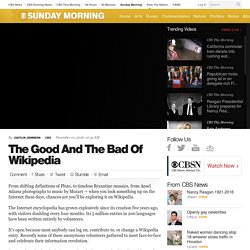
The Internet encyclopedia has grown explosively since its creation five years ago, with visitors doubling every four months. Its 5 million entries in 200 languages have been written entirely by volunteers. It's open because most anybody can log on, contribute to, or change a Wikipedia entry. Is Wikipedia a Credible Source? How Accurate Is Wikipedia? When you Google the question "How accurate is Wikipedia?
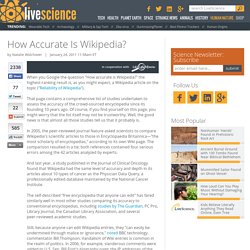
" the highest-ranking result is, as you might expect, a Wikipedia article on the topic ("Reliability of Wikipedia"). That page contains a comprehensive list of studies undertaken to assess the accuracy of the crowd-sourced encyclopedia since its founding 10 years ago. Of course, if you find yourself on this page, you might worry that the list itself may not be trustworthy. Well, the good news is that almost all those studies tell us that it probably is. In 2005, the peer-reviewed journal Nature asked scientists to compare Wikipedia's scientific articles to those in Encyclopaedia Britannica—"the most scholarly of encyclopedias," according to its own Wiki page.
Study: Wikipedia as accurate as Britannica. Wikipedia is about as good a source of accurate information as Britannica, the venerable standard-bearer of facts about the world around us, according to a study published this week in the journal Nature.
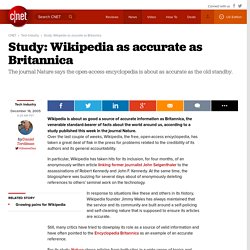
Over the last couple of weeks, Wikipedia, the free, open-access encyclopedia, has taken a great deal of flak in the press for problems related to the credibility of its authors and its general accountability. In particular, Wikipedia has taken hits for its inclusion, for four months, of an anonymously written article linking former journalist John Seigenthaler to the assassinations of Robert Kennedy and John F. Kennedy. Wikipedia vs Encyclopaedia: A question of trust? The sale of traditional encyclopaedias moved away from door-to-door sales to the ‘added value’ that came along with CD or DVD versions in the mid-90s.
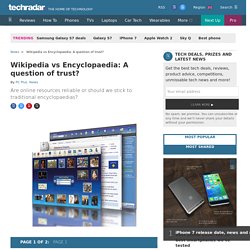
These disc-based versions sold well for a while and even encouraged some new players, like Microsoft and Dorling Kindersley, to get in on the act. Then the internet, with its free information philosophy, killed a lot of that market off. And when somebody said the magic word ‘Wiki’, the whole encyclopaedia compilation process was re-invented.
Rather than relying on panels of scholars to disseminate their knowledge from the top down, now anybody with some niche knowledge can create and edit topics, from the bottom up. This free online encyclopedia has achieved what Wikipedia can only dream of. Stanford Encyclopedia of Philosophy. Dilframework view all. Digital and Information Literacy Framework. Digital and Information Literacy Framework. What is digital literacy and how is it different from information literacy?
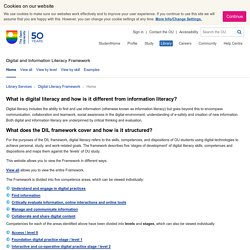
Digital literacy includes the ability to find and use information (otherwise known as information literacy) but goes beyond this to encompass communication, collaboration and teamwork, social awareness in the digital environment, understanding of e-safety and creation of new information. Both digital and information literacy are underpinned by critical thinking and evaluation. What does the DIL framework cover and how is it structured? ANCIL final. Brought to you by the CILIP Information Literacy Group. Motivation - learning community - HOTS and LOTS.
As educators we are promoting lower order thinking skills as well as higher order thinking skills - or LOTS and HOTS - within our students.
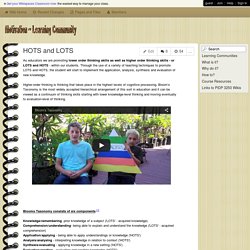
Through the use of a variety of teaching techniques to promote LOTS and HOTS, the student will start to implement the application, analysis, synthesis and evaluation of new knowledge. Higher-order thinking is thinking that takes place in the highest levels of cognitive processing. Critical/creative/constructive thinking is closely related to higher-ordered thinking and are unavoidably interwoven. These thinking processes progress upward in the given direction. First one critically analyzes the knowledge, information, or situation in the 'cognitive' domain. Back to 'Why do it? ' ^ Hammond, Glen B. Writing Resources - Essay Help. In a short essay, you have space for only a one-paragraph introduction.
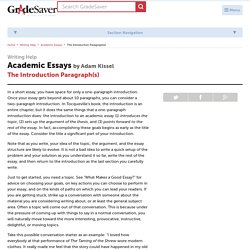
Once your essay gets beyond about 10 paragraphs, you can consider a two-paragraph introduction. Example Academic Essay. Seattle Children's Hospital. Dr.
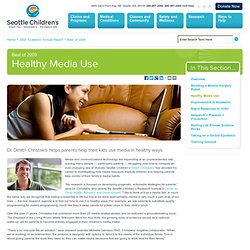
Dimitri Christakis helps parents help their kids use media in healthy ways. Media and communications technology are expanding at an unprecedented rate, leaving many people — particularly parents — struggling over how to navigate an ever-changing sea of choices. Seattle Children’s Dimitri Christakis has devoted his career to investigating how media exposure impacts children and helping parents take control of their family’s media habits. “My research is focused on developing pragmatic, actionable strategies for parents,” says Dr.
Christakis, who directs the Seattle Children’s Research Institute’s Center for Child Health, Behavior and Development. Over the past 11 years, Christakis has published more than 25 media-related studies and co-authored a groundbreaking book, The Elephant in the Living Room: Make Television Work for Your Kids. Info Lit Resources - November Learning.